高中情态动词课件大全
合集下载
《情态动词》PPT课件
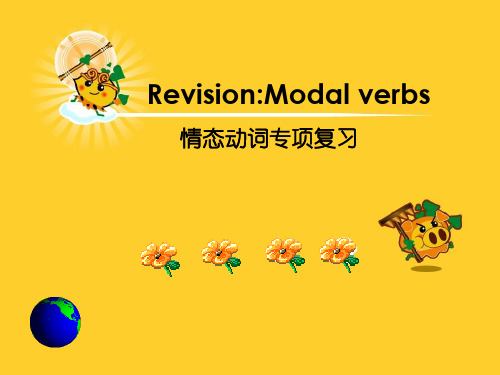
work our this problem. 如果你睡个好觉,那么你就能做出这个题目。 3、表示过去的能力: could表示过去一般的能力, 但不表示做或未做某事;
was/ were able to表示过去有能力并且成功地做了某事, 相当于managed to do something/ succeeded in doing something;
• Mr. Bush is on time for everything. How can it be that he was late for the opening ceremony? (表疑惑、惊讶)
表示请求、允许、允诺
1. 当对方是决策者时,你代表你(们)自己(I, We),或代表第三者(he,she,they)向对方 (you)请示或提出建议时用:
Revision:Modal verbs
情态动词专项复习
How many modal verbs
do you remember?
(情态动词)
一,常见的情态动词有:can, could, may, might ,must, shall, should, will, would, need, have to等
4、具有情态动词的某些特征的有:have(had) to, used to.
情态动词的特征
1、有一定的词义,但不能单独作谓语,它们要和行 为动词或连系动词连用,构成谓语。
2、适用于主语的各种人称和数 have to例外,主语 是第三人称单数时,要用has to)。如:
We/ He must work hard. 我们/他一定要努力工作。 I have to walk home. 我得步行回家。 He has to walk home. 他得步行回家。
was/ were able to表示过去有能力并且成功地做了某事, 相当于managed to do something/ succeeded in doing something;
• Mr. Bush is on time for everything. How can it be that he was late for the opening ceremony? (表疑惑、惊讶)
表示请求、允许、允诺
1. 当对方是决策者时,你代表你(们)自己(I, We),或代表第三者(he,she,they)向对方 (you)请示或提出建议时用:
Revision:Modal verbs
情态动词专项复习
How many modal verbs
do you remember?
(情态动词)
一,常见的情态动词有:can, could, may, might ,must, shall, should, will, would, need, have to等
4、具有情态动词的某些特征的有:have(had) to, used to.
情态动词的特征
1、有一定的词义,但不能单独作谓语,它们要和行 为动词或连系动词连用,构成谓语。
2、适用于主语的各种人称和数 have to例外,主语 是第三人称单数时,要用has to)。如:
We/ He must work hard. 我们/他一定要努力工作。 I have to walk home. 我得步行回家。 He has to walk home. 他得步行回家。
情态动词全部ppt课件

A.must
B.would
C.should
D.might
19
• 翻译 • ----我能在这个房间抽烟吗? .
---- 可以。 ---- 不行,… ----Might/ May I smoke in this room?
---- Yes, you can.
---- No, you mustn’t
20
rule.
(威胁)
26
Shall 决心、承诺、警告、命令 you \he\she\they shall…..(二三人称陈述)
When the chairman turns up, nobody shall say a word. 命令 Students shall remain in their seats until the papers have been
28
5. should
1. should表示义务、职责、劝告,意 为 “应该”。
eg: You should keep your promise. Students should respect teachers.
29
2)表示说话人_惊_讶______等特殊情感。
It’s surprising that Mary should not know Lei Feng.
3.must, need没有时态,但有些情态动词如can、 may,will,have to有一般式和过去式的变化。
4. 情态动词不能单独做谓语,必须和实义动词原形 一起构成谓语。
3
情态动词的“时态”形式并不是时间区 别的 主要标志, 不少情况下, 情态动词的 现在式 形式和过去式形式都可用来表 示现在时 间、过去时间和将来时间。
情态动词讲解ppt课件共33页共35页文档

谢谢!
35
26、要使整个人生都过得舒适、愉快,这是不可能的,因为人类必须具备一种能应付逆境的态度。——卢梭
▪
27、只有把抱怨环境的心情,化为上进的力量,才是成功的保证。——罗曼·罗兰
▪
28、知之者不如好之者,好之者不如乐之者。——孔子
▪
29、勇猛、大胆和坚定的决心能够抵得上武器的精良。——达·芬奇
▪
30、意志是一个强壮的盲人,倚靠在明眼的跛子肩上。——叔本华
情态动词讲解ppt课件共33页
•
46、寓形宇内复几时,曷不委心任去 留。
•
47、采菊东篱下,悠然见南山。
•
48、啸傲东轩下,聊复得此生。
•
49、勤学如春Leabharlann 之苗,不见其增,日 有所长 。•
50、环堵萧然,不蔽风日;短褐穿结 ,箪瓢 屡空, 晏如也 。
▪
高中英语语法专题复习课件--情态动词(共22张PPT)

but one of them 8. __c_o_u_ld___ (must, could) be your last. Decisions! Decisions! You may ask: 9. __m__u_st___ (can, must) I make decisions? The answer is yes. In most cases, you 10. __c_a_n_'_t__ (can't, needn't) skip this process.
_m__ig_h_t___ (shall, might) become the
richest.
(江西2014)
5. George __c_a_n_'t___ (mustn't, can't) have
gone too far. His coffee is still warm.
(浙江2016)
6. I _n_e_e_d_n_'_t_ (needn't, couldn't) have
2. No reader __s_h_a_ll___ remove a book from the library without the permission of the librarian.
can shall may should need
3. The girl ___ca_n____ not be Mary — she's in New York.
3. “情态动词+ have done”结构 1) could / might / should / ought to / need
have done意为“本来能/可能/应该/需 要做……,但实际上未做……”。如: He could have escaped, but he chose to stand and fight. It was an easy test and he should have passed, but he didn't.
高中英语 情态动词用法归纳全.ppt

1. You’re Tom’s good friend, so you must know what h waiting for you now.
四、 dare, need
1) dare作情态动词用时, 常用于疑问句、否定句和条件从句 中, 过去式形式为dared。
一、 can, could
2) 表示请求和允许。 -----Can I go now? ----- Yes, you can. / No, you can’t. 此时可与may互换。在疑问句中还可用could, might代替,不是过去式,只是语气更委婉,不能用于肯定
句和答语中。
---- Could I come to see you tomorrow? ---- Yes, you can. ( No, I’m afraid not. )
三、 must, have to
1) 表示必须、必要。 You must come in time. 在回答引出的问句时,如果是否定的,不能用mustn’t(禁止,
不准),而用needn’t, don’t have to(不必). ---- Must we hand in our exercise books today? ---- Yes, you must. ---- No, you don’t have to / you needn’t.
情态动词用法归纳
情态动词无人称和数的变化;不能单独 使用,必须与其后的动词原形构成谓语
一、 can, could
1) 表示能力(体力、知识、技能)。 Can you lift this heavy box?(体力) Mary can speak three languages.(知识) Can you skate?(技能) 此时可用be able to代替。 Can只有一般现在时和一般过去式;而be able to则有
四、 dare, need
1) dare作情态动词用时, 常用于疑问句、否定句和条件从句 中, 过去式形式为dared。
一、 can, could
2) 表示请求和允许。 -----Can I go now? ----- Yes, you can. / No, you can’t. 此时可与may互换。在疑问句中还可用could, might代替,不是过去式,只是语气更委婉,不能用于肯定
句和答语中。
---- Could I come to see you tomorrow? ---- Yes, you can. ( No, I’m afraid not. )
三、 must, have to
1) 表示必须、必要。 You must come in time. 在回答引出的问句时,如果是否定的,不能用mustn’t(禁止,
不准),而用needn’t, don’t have to(不必). ---- Must we hand in our exercise books today? ---- Yes, you must. ---- No, you don’t have to / you needn’t.
情态动词用法归纳
情态动词无人称和数的变化;不能单独 使用,必须与其后的动词原形构成谓语
一、 can, could
1) 表示能力(体力、知识、技能)。 Can you lift this heavy box?(体力) Mary can speak three languages.(知识) Can you skate?(技能) 此时可用be able to代替。 Can只有一般现在时和一般过去式;而be able to则有
模块十一情态动词_课件

① The dinner must be ready at 6:00.
② I must go now.
③You have to pass a special exam to get
into the school 1.He has to come back to school at weekend. 2. My mother had to work 12 hours a day.
注意:作为实意动词的need的 否定形式: don’t need to do 疑问形式:Do sb need to do sth ? 1.I need to go on a business trip to Wuhan (一般疑问句并作否定回答) need to Do _______ you ______________ go on a business trip to Wuhan? I don’t need to. ---No, ____________________ 2. Does she need to come ? needs --- Yes, she _______. B 3.Need she _____ the classroom again? A. cleans B. clean C. to clean D. cleaned
into the school.
B. 两者的否定形式和意思不同。
You mustn’t enter this room. You don’t have to hand it in now. mustn’t表示“禁止,不允许”。 don’t have to表示“不必”.
两者的提问方式不同。
1.I must start now.(一般疑问句) Must I start now? 2.They have to finish the homework immediately . (一般疑问句) Do they have to finish the homework immediately?
高中英语情态动词各种用法课件(共47张PPT)

一 、表能力 :表现在的或一般的能力:表示 现在的或一般的能力用can 或 be able to. 一 般的能力是指你无论什么时候做什么事情就 能做到的能力。表示现在的能力或一般的能 力时,can比be able to 更普遍。
A computer can’t think for itself; it must be told what to do. (表示一般的能力)
This can’t / couldn’t be done by him. (表示不 相信)
He could be on his way home now. (could 不 如 may / might常用)
Can this be done by him? (表示一种疑惑、 惊讶)
(3)would, could, should, might 并不一定 与过去的时间有关,而是表示可能性弱于他 们相应的现在形式。如:
do something / succeeded in doing sth.
The fire spread through the hotel very
quickly but everyone was able to get out. (过去有能力并成功地做了某事)
(3) could have + 过去分词,表示过去有 能力做但未做。
表示对过去已经发生的行为进行推测,意为 “想必 / 准是/ 一定做了某事
It must have rained last night, for the road was quite muddy.
The lights were out. They must have been asleep.
2. can have done
情态动词 专题课件(共28张PPT)
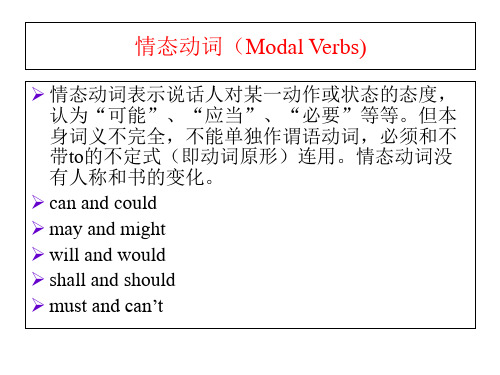
➢ 5. (may/can) ____c_a_n_____you swim? 表示能力
➢ 6. Listen, please. You (may not/might not)
____m__a_y__n_o_t______ speak during this exam.
表示不允许
may, might, can, could
may, might, can, could
表示猜测
➢ 1. They (can/might) ____m_i_g_h_t___be away for the
weekend but I’m not sure.
表示许可
➢ 2. You (may/might) ___m__a_y____leave now if you
can and could
➢So he can carry heavy books. ➢ability ➢He couldn't open the door by himself. ➢ability ➢Could you open the door, please? ➢request
can and could
表示猜测(不可能)
➢7. They (can not/may not) ___c_a_n_n_o_t_______ still be out, the light is on in the house.
➢8. You (couldn’t/might not) 表示许可
____c_o_u_ld_n_’_t_______ smoke on the bus.
➢9. With luck, tomorrow (can/could) ___c_o_u_ld____be a cooler day. 表示猜测
高中英语情态动词PPT课件
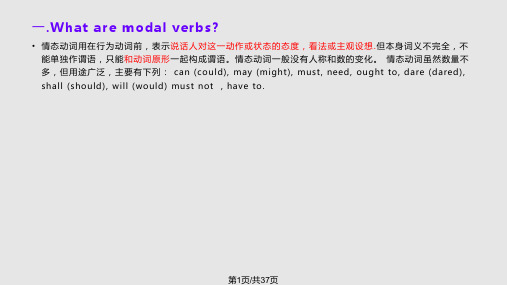
第11页/共37页
very uncertain
almost certain
might may could (can) should ought to will must
1.He _____ be at home.
A.may B.might C.must
2.He _____ be at home, for he just called me from his home 15 seconds ago.
Would rather…
第20页/共37页
will/would:
2.表示意志、愿望和决心。 有愿意,要的意思,will指 现在,would指过去的习惯 性动作或倾向。
I will never do that again.
I would go there with you.
第21页/共37页
will/would:
can表示与生俱来的能力或一种客观可能,而 be able to更加强调通过后天的学习和努力获 得的能力,或者在某个客观的场合和背景下, 能做到的事情。
第8页/共37页
advisability
necessity
ought to/should
have to
must
Your mother brings you up and takes good care of you, so when she is old, you ___ look after her in return.
第15页/共37页
4.Permission(允许) may/might:
1. 表示许可,常译为可以。表示请 求、允许时,might比may的语气 -更Mi委gh婉t/一M些ay。I use your computer? - Yes, you can. /No, you can’t/mustn’t.
very uncertain
almost certain
might may could (can) should ought to will must
1.He _____ be at home.
A.may B.might C.must
2.He _____ be at home, for he just called me from his home 15 seconds ago.
Would rather…
第20页/共37页
will/would:
2.表示意志、愿望和决心。 有愿意,要的意思,will指 现在,would指过去的习惯 性动作或倾向。
I will never do that again.
I would go there with you.
第21页/共37页
will/would:
can表示与生俱来的能力或一种客观可能,而 be able to更加强调通过后天的学习和努力获 得的能力,或者在某个客观的场合和背景下, 能做到的事情。
第8页/共37页
advisability
necessity
ought to/should
have to
must
Your mother brings you up and takes good care of you, so when she is old, you ___ look after her in return.
第15页/共37页
4.Permission(允许) may/might:
1. 表示许可,常译为可以。表示请 求、允许时,might比may的语气 -更Mi委gh婉t/一M些ay。I use your computer? - Yes, you can. /No, you can’t/mustn’t.
高中英语语法 情态动词用法总结(20张PPT)-经典通用课件资料
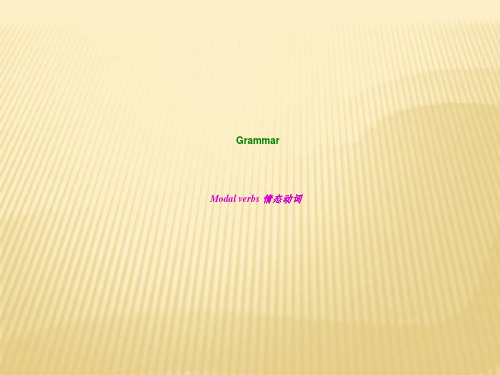
A. could B. would C. should D. might
C
2. What do you mean, there are only ten tickets? There_____
A. should CA. will
B. would D. shall
be twelve.
2021/10/10
13
5. must
1. 表示义务或强烈的劝告,意为“必须”“应该”, 其否定式表示“不应该”“不许可” “不准”“禁止”。
Eg: 1) You must finish your homework first. 2) Children mustn’t speak like that to their parents.
3. 表推测,用于肯定句,意为“一定”“务必”。
Eg: 1) Betty must be in the next room. 2) He must be watering the flowers in his garden.
2021/10/10
14
Complete the following sentences using modal verbs.
5) Can/Could I use your dictionary? 6) Could you lend me a hand?
3. 表示“请求” “允许”(表请求时,口语中常用 could 代替 can 使语气更委婉,回答时用can)
2021/10/10
4
4. 表示“许可”,可与may 换用。 You can go home now.
1. 表“请求、建议”等,用 would 比用will 委婉,客气些 Eg: 1)Will you lend me your book? 2) Would you like a cup of tea?
《情态动词课件》ppt课件

(00 上海)
My sister met him at the Grand A Theatre yesterday, so he ______ your lecture. A. couldn’t have attended
B. needn’t have attended C. mustn’t have attended D. shouldn’t have attended
24
Could 表可能性,语气较弱; 表请求,较委婉。 —Could you lend me some money? —Yes , I can. (98 上海) “ Could I call you by your first name?” C “ Yes, you _____. A. will B. could C. may D. might
3
情态动词可用来表示推测,语气从强到弱的顺序是: must,should,can,could, may ,might。
一.情态动词表示推测的用法
1.must所表示的可能性最大,最有把握,意为“一
定”。
2.can和could主要用于否定句和疑问句中 ,can’t
或couldn’t 表示“不可能”
3.may 和 might表示现在或将来可能发生的动作
13
(NMET 05)
B He ______ have completed his work; otherwise, he wouldn’t be enjoying himself by the seaside. B. must A. should C. wouldn’t D. can’t
14
6
3. ● He may not have finished the exercises, I’m afraid. may/might have done(过去) 或许/可能做 …(用于肯定或否定句中) 4. You could have done better, but you didn’t try your best. could have done (过去) 本能够做 (用于肯定或否定句中,带有责备、劝告之意)
高中英语情态动词课件
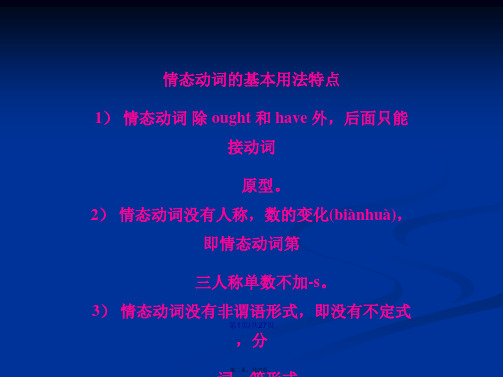
第7页/共27页
第八页,共27页。
3 must 语 have to 的 用法(yònɡ fǎ)
1 You must come to school on time . You mustn't waste any more time(必须(bìxū),禁止)
2 Must I come back before ten ?
第15页/共27页
第十六页,共27页。
You ought to have helped him with hisCEnglish, ____you ?
A. won’t you B. ought not you C. shouldn’t you D. wouldn’t you
第16页/共27页
第5页/共27页
第六页,共27页。
2 may / might
1 May I watch Tv after supper? Yes you may /No ,you mustn't.(请求(qǐngqiú)许可 2 It may be true ./ she may come tomorrow / He might have some fever(推测) 3 May you succeed ! May you have many more days as happy as this one(祝愿)
第十五页,共27页。
------When can I come for the photos ? I need them tomorrow afternoon.
-----They ___B__be ready by 12 : 00 . (
A. can
B. should
C. might D. need
第八页,共27页。
3 must 语 have to 的 用法(yònɡ fǎ)
1 You must come to school on time . You mustn't waste any more time(必须(bìxū),禁止)
2 Must I come back before ten ?
第15页/共27页
第十六页,共27页。
You ought to have helped him with hisCEnglish, ____you ?
A. won’t you B. ought not you C. shouldn’t you D. wouldn’t you
第16页/共27页
第5页/共27页
第六页,共27页。
2 may / might
1 May I watch Tv after supper? Yes you may /No ,you mustn't.(请求(qǐngqiú)许可 2 It may be true ./ she may come tomorrow / He might have some fever(推测) 3 May you succeed ! May you have many more days as happy as this one(祝愿)
第十五页,共27页。
------When can I come for the photos ? I need them tomorrow afternoon.
-----They ___B__be ready by 12 : 00 . (
A. can
B. should
C. might D. need
- 1、下载文档前请自行甄别文档内容的完整性,平台不提供额外的编辑、内容补充、找答案等附加服务。
- 2、"仅部分预览"的文档,不可在线预览部分如存在完整性等问题,可反馈申请退款(可完整预览的文档不适用该条件!)。
- 3、如文档侵犯您的权益,请联系客服反馈,我们会尽快为您处理(人工客服工作时间:9:00-18:30)。
need /dare
a. need 表需要和必须常用于否定句和疑问 句,needn’t have done “本不必做…” b. dare 表敢,常用于否定句,疑问句和条件句 中。 c. dare与need 用做实意动词时有时态,人 称和数的变化,但dare用于否定句和疑问句时 常接不带to的不定式,need后要接带to的不定 式。
They may come here tomorrow. 他们可能还在等我们呢。 They may be still waiting for us.
2.might 可用于指过去的行为或者表示可能性 更小。
e.g.他也许在做功课吧。 He might be doing his homework now. 我问他我是否可以离开。
must 和have to
1.must用于一般问句中,肯定回答用must否 定式用 needn’t或don’t have to,做 “不 必”,mustn’t表示“禁止,不允许”
e.g.— Must I finish all assignments at a time? —Yes, you must. No, you needn't. You mustn’t get off while the car is still moving.
I asked him ―May I leave now?‖ I asked him if I might leave.
3.might/may have done,表示对过去发生的动 作进行可能性推测。 e.g.他可能去医务室了。 He may have gone to the clinic. 他可能已经从报纸上知道这个消息了。 He might have read about the news in the newspaper.
must
1.must 表示推测时, 只能用于肯定句。 e.g.这个电脑肯定出了问题。 There must be something wrong with the computer. 你努力学了一整天, 一定累了吧 You have worked hard all day. You must be tired.
may 1. I don't know where she is, she _______ be in Wuhan. must be marking 2. At this moment, our teacher ________________ our exam papers. 这时,我们老师想必在批改试卷。 3. The road is wet. It ________________ last night. must have rained
Grammar
modal verbs
can could may might shall should must will would 情态动词 ought to have to dare (daren’t) need (needn’t) used to
表示推测
不表示推测
情态动词有一定的意义,但没有人称和数的 变化,不能独立使用,它和后面的动词构成 谓语.
must , can/could, may/might 的用法
注意:must用于肯定句中可表示“偏偏”。 Naturally, after I told her what to do, my daughter must go and do the opposite. 自然地,在我交代女儿做什么之后,她偏偏要
3.must +have done 表示对过去发生的事情作 出的肯定判断 e.g.他们在玩篮球, 他们一定完成了作业。 They are playing basketball, they must have finished their homework. 路是湿的。昨天晚上一定下雨了。 The road is wet. It must have rained last night.
可能性依次减弱
(对过去情况推测:must may, might)+完 成时。 e.g. You must have met him before.
must—may—might可能性依次减弱
must只能用于肯定句,译成“一定”。否定 和疑问分别用can’t / couldn’t和can / could。
对现在或将来情况推测:must +动词原形。
must只能用于肯定。否定和疑问分别用can’t 和can。 e.g. He must tell a lie.
Can he tell a lie ? He can’t tell a lie.
*must-should/ought to –may-might/could+do
e.g. Could /Can it have happened last night ?
It couldn’t/can’t have happened last night.
can/could
1. can /could 表示推测时,只能用在否定句 或疑问句中。 e.g. It’s so late. Can Tom be reading? Can it be Mr. Green? 这个人不可能是玛丽, 她生病了。 It can’t be Mary. She has fallen ill. 她不可能在说谎。 She couldn’t be telling lies.
shall/should
1.shall 用于第二、三人称陈述句中,表示说话 人给对方的命令,警告,允诺或威胁。 e.g.1)You shall go with me.(命令) 2)You shall have the book when I finish it.(允诺) 3)He shall be punished.(威胁) 2. shall用于第一、三人称疑问句中,表示说话人 征求对方的意见和向对方请示。 e.g.4)Shall we begin our class?(征求意见) 5)When shall Mike be able to leave hospital?(请示)
must
可能的推测
+ V. + have done + be doing
may, might
否定的推测
+ V. + have done + be doing 可以用not表示“可能不” + V. + be doing + V. + be doing + have done
can’t, couldn’t
I wonder if you could help me. (请
求)
2. can/could have done 对过去发生行为的可 能性进行推测: 刚才我还看见他了, 所以他不可能出国的。 I saw him just now so he couldn’t have gone abroad. 门是锁着的, 所以她不可能在家。 The door was locked. She couldn’t have been at home.
2.表示“必须”这个意思时,must 和 have to 稍有区别。must着重说明主观看 法,have to 强调客观需要。另外, have to 能用于更多时态。 e.g. I don’t like this TV set. We must buy a new one. There was no more bus. They had to walk home.
做相反的事情.
2.must +be doing/do 表示对现在的动作进行 肯定推测 e.g.他现在一定在看小说. He must be reading novels now. 他们买了一辆新车。 他们一定很有钱. They have bought a new car. They must have a lot of money.
2. should 的用法 注意:should可表示“居然,竟然”。 e.g.我不敢相信这样一个绅士居然对老人如此 无礼。 I can’t believe such a gentleman should be so rude to the old.
3. should常表示劝告、建议、命令,与 ought to意义相近,但ought to多表示责任、 义务,语气强烈。在疑问句中通常用should 代替ought to。 e.g. Young people should learn how to use computers. Every citizen ought to obey law.
只作情态动词的
can/could, may/might, ought to, must 可情态可实义的 need, dare/dared 可情态可助动词的 shall/should, will/would 相当于情态动词的 have to, used to
must , can/could, may/might 的用法
You ought not to go.
4.should/ought to have done表示责备或 批评,意为“本应该做到…但没有做到…”,用 于否定则表示“本不该…但”ought to的语 气更强烈. e.g. You should/ought to have told her the truth earlier. She shouldn’t have left without saying a word.
3.用于条约,规定,规章等文件中,表示 一种义务,多用于第三人称中。 6) “The interest ___be divided into five parts, according to the agreement made by both sides.” declared the judge. A. may B. should C. must D. shall
